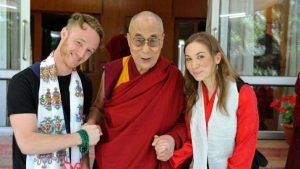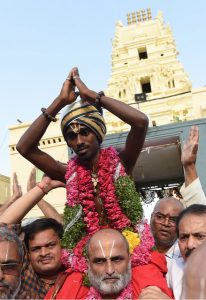
Fourteen years ago, José Cabezón argued brilliantly that “theology” should no longer be a dirty word in Buddhism (despite being derived from the Greek word theos, or “God”). He proposed that Buddhist theology simply serves a similar task to the theological systems of other faiths. As a discipline, Buddhist theology mounts academic and philosophical defenses on Buddhism’s behalf and critically studies its entire world view, including how the Buddha himself should be religiously understood (Cabezón 2003, 39–40). But in a Buddhist version of political correctness gone mad, theology as a term remains almost taboo in many Buddhist circles. Master Huijing’s book on the protagonist of the Pure Land tradition, the Buddha Amitabha, is the perfect publication to recommend to those of little faith in Buddhism’s ability to do good theology.
What Kind of Buddha Is Amitabha? originated as a lecture given by Master Huijing in Xiamen in October 2006. Translated into English by Householder Jingpu and edited by Householder Jingtu, it is one of the most popular books in the Chinese and English collections published by the Chinese Pure Land Association. This small book is an erudite summary of the most crucial points for a Pure Land devotee to remember as she nurtures her relationship with Amitabha.
A basic theological conversation might involve an exegesis of Amitabha’s names (Amitabha and Amitayus), which indicate “infinite light” and “infinite life,” respectively (there has been a long-standing debate about whether Amitabha’s names should be taken literally). But What Kind of Buddha Is Amitabha? goes further and offers a much richer discussion.
Master Huijing employs four theological statements to articulate Amitabha’s nature and relationship with us: first, Amitabha is “a Buddha who has fulfilled his Fundamental Vow.” Of the 48 vows Dharmakara made before fulfilling them and becoming Amitabha, Master Huijing speaks of the 18th Vow as both the most basic and most transcendent. This vow definitively reveals Amitabha to sentient beings as a Buddha whose central desire is to “deliver all sentient beings to the Land of Bliss” (Huijing 2006, 6)—a vow, Master Huijing points out, that is unmatched by any other divinity in its compassion and universality. It also helps us understand how Amitabha wishes sentient beings to draw closer to him: namely, to build a relationship with him based on sincere faith through chanting “Namo Amitabha Buddha,” or “Namo Amituofo.”
Secondly, Master Huijing suggests that Amitabha “is a Buddha who delivers sentient beings from suffering.” Basing his argument on the Infinite Life Sutra, Master Huijing casts Amitabha’s relation to suffering beings as one of a long-lost parent: “For ten kalpas, Amitabha Buddha has been calling out to us. . . . He even pressed his palms together to implore us, saying: All sentient beings are my sole children. . . . My children, please hurry home so that you will find peace and happiness!” (Huijing 2006, 14–15). This moving imagery illustrates, however inadequately, the I-Thou, Lover-Beloved connection Amitabha hopes we can share with him.
Master Huijing delves deeper into the devotee’s bond with Amitabha through his third statement: Amitabha “is a Buddha whose light embraces reciters of his name.” Here, he ties together the Buddha’s salvific name with the concept of infinite light. Amitabha is the embodiment of infinite, unimpeded light throughout the cosmos (Huijing 2006, 16–17). His name contains all his light, thus recitation of the name in accordance with the 18th Vow acts as the ultimate purification: “When we ordinary beings recite this name of light with our tiny minds, we merge with Amitabha Buddha and his light. The light from our bodies will follow Amitabha’s infinite light to the farthest, boundless reaches of the universe” (Huijing 2006, 18).
Finally, Amitabha “is a Buddha whose light receives reciters as they are about to die.” Master Huijing expresses the soteriological doctrine of the Pure Land tradition beautifully: “As long as we want to be born in the Pure Land and recite his name exclusively, Amitabha Buddha will receive us when the time comes. From now till the end of our lives, Amitabha will not abandon, forget or forsake us even for a moment” (Huijing 2006, 20). He also pre-empts concerns about being unable to recite his name at the time of death: “He will come to welcome us whether we are clear-headed at the time, or in a coma. . . . Amitabha knows your condition. . . . He knows if the individual can recite or not, and is conscious or not” (Huijing 2006, 20). Since the stakes of the afterlife take precedence over any worldly concern, this is a most comforting assurance.
Master Huijing has a unique talent for eloquently theologizing about Amitabha while retaining the latter’s simple core revelation. The translator and editor deserve full credit for channeling the Venerable’s persuasiveness into English. The length of the publication is only 32 pages, yet it charts Amitabha’s entire plan to deliver beings to his Pure Land (which guarantees us all Buddhahood). Being saved by Amitabha’s power in turn empowers us to save others on a cosmic scale. It is the Pure Land devotee’s spiritual destiny. What Kind of Buddha Is Amitabha? is an inspiring and sometimes moving handbook that should serve as a primer for any reader wishing to encounter the profound theological rationale that informs Pure Land doctrine.
What Kind of Buddha Is Amitabha? is available as an e-book for free download on the Pure Land Buddhism website. You can also request a printed copy.
References
Cabezón, José. (2000) 2003. “Buddhist Theology in the Academy.” In Buddhist Theology: Critical Reflections by Contemporary Buddhist Scholars, edited by Roger Jackson and John Makransky, 25–52. Reprint, London: RoutledgeCurzon.Ven. Huijing. 2006. What Kind of Buddha Is Amitabha?. Translated by Householder Jingpu, edited by Householder Jingtu. Taipei: Chinese Pure Land Association.









